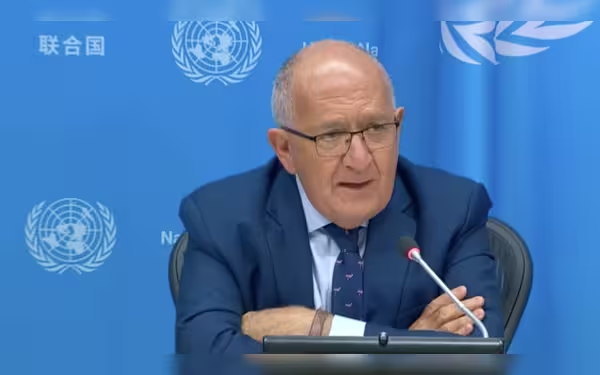Saturday, November 16, 2024 09:57 PM
UN Inquiry Member Warns Gaza Conflict Fuels Terrorism
- Gaza conflict impacts children severely.
- Urgent need for psychological support highlighted.
- Systematic destruction of healthcare reported.
 Image Credits: arabnewspk
Image Credits: arabnewspkChris Sidoti warns the Gaza conflict is a 'factory for terrorism,' stressing the urgent need for resolution and support for affected children.
In recent weeks, the conflict in Gaza has escalated dramatically, drawing international attention and concern. The ongoing violence has raised alarms about its long-term implications, particularly for the younger generation caught in the crossfire. Chris Sidoti, a former Australian human rights commissioner and a member of the UN’s Independent International Commission of Inquiry on the Occupied Palestinian Territory and Israel, has voiced serious worries about the situation, labeling it as an "Israeli terrorism creation factory." This statement underscores the urgent need for a resolution to the conflict, which has persisted for decades.
During a press conference at the United Nations headquarters in New York, Sidoti highlighted the devastating impact of the conflict on children. He pointed out that while the violence affects all civilians, it is the children who bear the brunt of the suffering. "Kids aren’t terrorists," he emphasized, noting the tragic loss of life among young ones. On October 7, 38 Israeli children lost their lives, including a toddler under the age of two. In stark contrast, since that date, at least 13,319 children have been killed in Gaza, with 786 of them being infants. Additionally, 165 children have died in the West Bank, painting a grim picture of the humanitarian crisis.
Sidoti warned that without immediate intervention, the situation is likely to deteriorate further. He expressed concern over the future of the one million children living in Gaza, questioning what their lives will look like in 20 years if the violence continues. He stated, "The conflict in Gaza is an Israeli terrorism creation factory and there is no sign of it finishing." His remarks reflect a growing fear that the cycle of violence will perpetuate itself, leading to more hostility and suffering.
Moreover, Sidoti addressed the long-term trauma that children endure as a result of the conflict. The loss of parents, siblings, and other family members leaves deep emotional scars that can affect their lives forever. He stated, "The kids who are traumatized by the loss of parents, siblings, aunties, uncles, grandparents, cousins, can’t go through what they have had to experience without this having a severe impact on them and their lives forever." This highlights the urgent need for psychological support and intervention for these vulnerable children.
The commission's latest report, released on October 30, paints a dire picture of the situation in Gaza, detailing systematic destruction of the healthcare system and attacks on medical personnel. The report accuses Israeli security forces of committing war crimes, including the deliberate killing and mistreatment of medical staff and the targeting of medical vehicles. Such actions not only violate international law but also exacerbate the humanitarian crisis.
In addition to the suffering of civilians, the inquiry also documented abuses faced by hostages from both sides. Sidoti revealed that many hostages experienced mistreatment, including physical violence and sexual abuse. He stated, "We found there was strong evidence of torture, of significant mistreatment, and a wide variety of human rights abuses that, in both cases, constituted war crimes." This acknowledgment of abuses on both sides underscores the complexity of the conflict and the urgent need for accountability.
Reflecting on the broader context, Sidoti noted that the violence has deep historical roots, stating, "It’s been going on for 85 years... The parties are not willing to find a way to resolve it." Despite the bleak outlook, he remains committed to the work of investigation and advocacy for accountability. He believes that, eventually, those responsible for war crimes will face justice.
The situation in Gaza is a stark reminder of the human cost of conflict, particularly for the most vulnerable members of society—children. As the world watches, it is crucial for all parties involved to seek a peaceful resolution to the violence. Only through dialogue and understanding can we hope to break the cycle of suffering and build a future where children can grow up in safety and peace. The time for action is now, as the lives of countless children hang in the balance.













